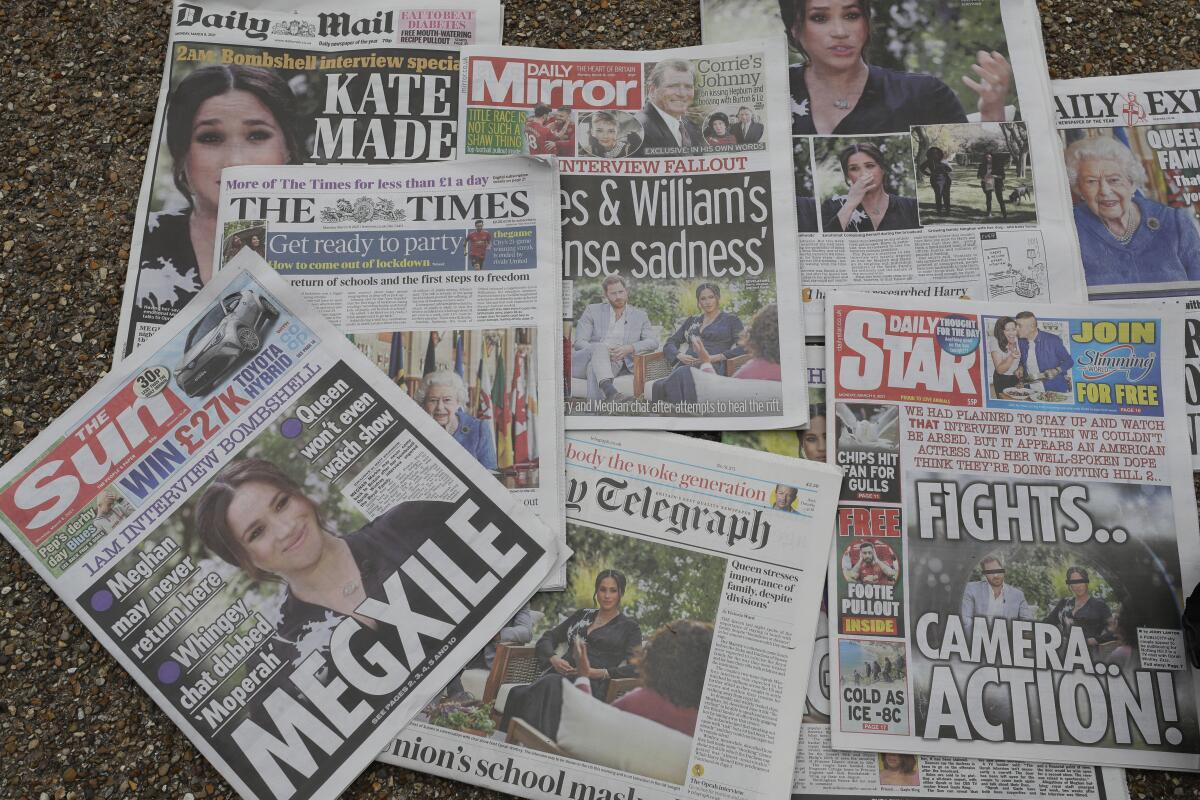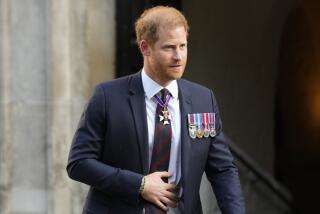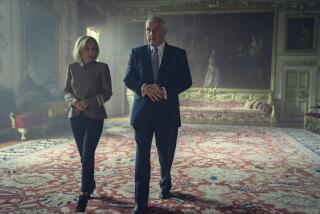From Britain’s aggressive tabloids, no regrets over royal pair’s treatment

- Share via
LONDON — Britain’s tabloid newspapers — pugnacious, salacious and utterly unabashed — have long played an outsized role in the country’s culture and society. They gleefully stalk celebrities, pounce on scandal, make or break political careers, prop up or tear down iconic national institutions.
Few were surprised, then, that the tabloids — mass-audience publications whose lurid headlines and compact dimensions once set them apart from the country’s more somber “broadsheet” papers — emerged as a key player in the tumultuous saga of Prince Harry and Meghan, Duchess of Sussex.
By the couple’s account, a drumbeat of lies and overt racism in tabloid accounts exacerbated and amplified the travails that ultimately led them to leave palace life behind. Harry blamed the “toxic” environment on intimidation, saying his royal relatives were cowed into submission, unwilling to publicly defend the pair, because they were afraid of bad press.
“There is this invisible contract” between the monarchy and the tabloids, based on “a level of control by fear that has existed for generations,” the prince told Oprah Winfrey in an interview watched by millions of people this week.
However cartoonish they might appear at times, with their garish graphics and jumbled images, the tabloids have carved out a unique and powerful niche in British society, analysts say.
More than a century and a half ago, when serious newspapers were the province of an educated elite, the tabloids pioneered a winning formula of short, sharp, sensational accounts of gruesome crime and disgraceful doings, and haven’t looked back. With a readership base of millions, they can sway public opinion on weighty national issues like Brexit, the 2016 vote for Britain to exit the European Union that finally came to full fruition at the start of this year.
Some observers saw common themes threaded through tabloid coverage of the drawn-out Brexit debate and the stream of stories that Harry and Meghan, who has a Black mother and a white father, said made life as senior royals untenable.
“There was a real undercurrent of racism throughout Brexit,” said Steven Barnett, professor of communications at the University of Westminster. “It’s difficult not to view the negative coverage of Meghan within that same sort of purview.”
After the Oprah interview aired, the pair — but Meghan in particular — again were in the tabloid crosshairs. “WHAT HAVE THEY DONE?” asked the Daily Mail in an all-caps headline Tuesday.
Royal commentators quoted in the tabloids zeroed in on what they described as disrespect for the monarchy, even though the duke and duchess praised the queen in their interview. “So Sad It Has Come To This,” said the Daily Express, pairing the headline with a photo of the 94-year-old Elizabeth looking pained.
Harry and Meghan’s battle with the tabloids long predates the Oprah interview. Back in 2016, the two had barely begun dating when the broadsides against her began, many filled with racist and sexist tropes that drew a fierce response from her husband-to-be.
In one particularly notorious episode, the Daily Mail wrote that “Harry’s girl is (almost) straight outta Compton,” referring to the neighborhood of Meghan’s mother, Doria Ragland. Another tabloid, the Sun, ended up apologizing for a story, also in 2016, which carried the headline “Harry’s girl on Pornhub.”
After their marriage, the torrent continued apace, including criticism that by eating avocado toast, Meghan was contributing to environmental devastation and human rights abuses. “That’s a really loaded piece of toast,” the duchess told Oprah.
In a 2019 documentary that aired on Britain’s ITV, Meghan said acquaintances familiar with over-the-top tabloid vitriol warned her about her engagement to Harry, fearing she would become a target.
“My British friends said to me: ‘I’m sure he’s great. But you shouldn’t do it, because the British tabloids will destroy your life,’” she said in the film.
Last month — a full year after Meghan and Harry first embarked on their split with the royal family — the pair notched a victory in their feud with the tabloids: A judge ruled that Meghan’s privacy had been invaded by the Mail on Sunday. The paper had published a private letter she sent to her father, Thomas Markle, with whom she does not speak.
But the Oprah interview offered the tabloids another opportunity to dwell on the duchess’ estrangement from her father. He went on British television — video that was swiftly posted on the Metro tabloid’s website — to declare that the couple should not have spoken out at a time when the queen’s husband, Prince Philip, is hospitalized.
“Considering the queen’s age and Philip’s age, they should have waited, or tried to wait,” he said.
While court rulings against the tabloids are relatively rare because celebrities are largely considered fair game, other excesses have sometimes drawn devastating rebukes. A decade ago, media mogul Rupert Murdoch shut down his News of the World, ending the 168-year run of the country’s bestselling weekly tabloid, after a phone-hacking scandal that convulsed the country.
Britons were outraged when it emerged that Milly Dowler, a teenager who was abducted and murdered, was among thousands whose voicemails were hacked. The episode triggered a judicial public inquiry into newspaper practices and ethics, centered on the tabloids.
Along with mainstream print newspapers, the tabloids have struggled in recent years with circulation and finances. But they still possess enormous influence over public opinion, and few politicians dare to dismiss them.
When then-Prime Minister Theresa May traveled to the United States in 2017 to meet then-President Trump, the only nonpolitical figure with whom she scheduled a sit-down encounter was Murdoch.
Barnett, the university professor, said he did not expect any major reckoning for the tabloids over the treatment of Harry and Meghan, even though the drama has revived memories of Princess Diana’s ejection from the royal fold after her split with Prince Charles, Harry’s father and the heir to the throne.
Harry has often said that attacks on Meghan — reminiscent of the relentless tabloid coverage of his mother before she was fatally injured in a 1997 Paris car crash, with the paparazzi in pursuit — made him feel history was repeating itself. He was 12 when she died.
“I would love to think that this would change things, but you only have to look at the way the press is treating the couple now,” Barnett said, pointing to fresh post-Oprah attacks against Harry and Meghan. “It’s all very negative.”
But writer and historian David Olusoga expressed hopes that Britain might yet engage in some soul-searching over the scorchingly contemptuous treatment of a biracial outsider who many once hoped would help transform a hidebound monarchy.
“We allowed our press to hound this woman,” he told the BBC. “It says something about us.… It’s about us as a nation.”
Special correspondent Boyle reported from London and Times staff writer King from Washington.
More to Read
Sign up for Essential California
The most important California stories and recommendations in your inbox every morning.
You may occasionally receive promotional content from the Los Angeles Times.










